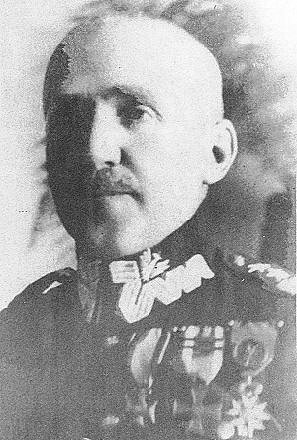Ignaz Kasimir Maria Graf Ledóchowski

Personalia
Born:
Died:
Profession:
Persecution:
Imprisonment 01.07.1944 - 29.07.1944
Groß-Rosen concentration camp 29.07.1944 - 11.02.1945
Dora-Mittelbau concentration camp 11.02.1945 - 06.03.1945,
Murdered on 06.03.1945
KZ Number:
Honors:
Knight's Cross of the Order of Leopold
Order of the Iron Crown III. class
Cross of the Legion of Honor
Curriculum Vitae
Ignaz Kasimir Maria Count Ledóchowski [in Polish: Ignacy Kazimierz Maria Count Ledóchowski) was born as one of 12 children of the Imperial and Royal Chamberlain and Knight Commander Count Anton August Ledóchowski. Count Anton August Ledóchowski and his wife Josefine, née Countess Salis-Zizers, on the family estate in Loosdorf in Lower Austria. His siblings included Blessed Maria Theresa Countess Ledóchowska, St. Ursula Countess Ledóchowska and the Jesuit General Wladimir Dionizy Count Ledóchowski. The family came from an old Austrian-Polish noble family.
For Ignaz Count Ledóchowski, a military career was planned, for which he attended boarding school at the military school in St. Pölten after elementary school. At the end of his four-year schooling in St. Pölten, he transferred to the military school in Weißkirchen in 1886. In 1889, he continued his training at the Vienna War Academy, which he completed in 1892 with the officer's examination. In the same year, he joined the Austro-Hungarian army with the rank of lieutenant and was transferred to the Krakow garrison. In 1896 he was promoted to first lieutenant. From 1897 to 1899 he was in Vienna for general staff training at the War Academy. He was promoted to captain in 1902 and major in 1913.
In 1903, he married Paulina Countess Lubieńska in Krakowiec, Jaworów powiat. The marriage produced four children, Hedwig, Maria Theresa, Josef Maria and Vladimir Ignaz.
During the First World War, Count Ignaz Ledóchowski fought as commander of an Austro-Hungarian regiment in Volhynia and Italy. After the end of the war, he joined the newly founded Polish army in 1918, fought in the Polish-Soviet War, then advanced to lieutenant general and held leading positions at the Krakow and Łódź military district commands. After Józef Piłsudski's coup d'état, he left the army in February 1927 and from then on managed his estate in Wólka Rosnowska near Lviv.
After the invasion of the German Wehrmacht and the Red Army and the subsequent partition of Poland along the Ribbentrop-Molotov Line in September 1939, the family fled from the Soviet occupiers to their estate Lipnica Murowana in the German part of the country.
As a staunch opponent of National Socialism, Ignaz Count Ledóchowski made contact with the Armia Krajowa (the Polish Home Army). He supported the underground army in various ways, including by administering funds and as an advisor in the formation and training of partisan units.
In the summer of 1944, the Armia Krajowa felt so sure of its cause in view of the Wehrmacht's defeats that it more than once disregarded the necessary precautions. Thus, one morning in June 1944, in the forest near Iwkowa, a few kilometers south-east of Lipnica Murowana, a ceremonial pledge of allegiance is held for officers newly accepted into the Armia Krajowa, with a field mass, flag procession, singing of the national anthem and a defile, which Ignaz Count Ledóchowski takes as the most senior officer. Against all rules of conspiracy, the event is captured on film. The Gestapo came into possession of these photos and identified the soldiers depicted. Ignaz Count Ledóchowski ignored warnings of an imminent arrest, citing his age.
On July 1, 1944, Ignaz Count Ledóchowski was arrested by the Gestapo and taken to the prison in Montelupi Street in Krakow. There he was interrogated intensively. He did not deny belonging to the Armia Krajowa. On July 27, 1944, he was finally deported to the KZ Groß-Rosen. He was sent to the 'weaving workshop' detachment, where old and weakened prisoners had to make straw shoes, woven mats, ropes and the like. His sincerity and deep Catholic piety earned him the nickname 'The Holy General' among the guards, which was in no way meant to be derogatory. Fellow prisoners helped him wherever they could, especially secretly at work, so that he could fulfill his duties, and even the Kapos left him alone. From January 29, 1945 to February 7, 1945, he was in the infirmary of the concentration camp.
When the Gross-Rosen concentration camp was evacuated due to the approaching Red Army, the SS deported Ignaz Graf Ledóchowski to the Dora-Mittelbau concentration camp
I bid adieu to the living, the dead call me. Let me die in peace.
Places
Residence:
Persecution:
Death Place:
Citations
Neander, Joachim (2004): Polen und wir. 4/2004 (Düsseldorf)
Auskunft Gedenkstätte KZ Groß-Rosen
Wikipedia unter de.wikipedia.org/wiki/Ignacy_Kazimierz_Ledóchowski
Matricula Online
